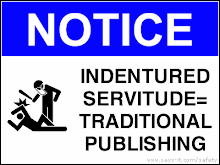 Status: Living with the in-laws. (Help! SOS!)Watching: Nothing. Listening to: The "f"-Word. (Cooking show.)Reading: The Death Star. Page 327.TOPIC: SELF-PUBLISHING AND WHAT IT MEANSSelf-publishing is nothing new. According to Writer's Digest, it's been around since the days of John Milton.Defenders of self-publishing routinely point to such historic works like Aeropagitica as a celebration of the practice.Businesses that offer such services can be traced back to newspaper ads from the 1930s--where they suggested that 'chapbooks' filled with poems would make excellent gifts or close friends and family members, but also warned against the idea that this route would lead immediately to fame and riches.Because they are right.Self-publishing is a gamble which shouldn't be taken lightly.Even though print-on-demand (POD) and digital technologies have greatly improved the quality and layouts of self-published books since the 1990s--self-publishing still remains a "last resort" for those of us whom have failed to capture the attention and imagination of the mainstream publishing network.But if you are considering self-publishing, then consider the following statistics:
Status: Living with the in-laws. (Help! SOS!)Watching: Nothing. Listening to: The "f"-Word. (Cooking show.)Reading: The Death Star. Page 327.TOPIC: SELF-PUBLISHING AND WHAT IT MEANSSelf-publishing is nothing new. According to Writer's Digest, it's been around since the days of John Milton.Defenders of self-publishing routinely point to such historic works like Aeropagitica as a celebration of the practice.Businesses that offer such services can be traced back to newspaper ads from the 1930s--where they suggested that 'chapbooks' filled with poems would make excellent gifts or close friends and family members, but also warned against the idea that this route would lead immediately to fame and riches.Because they are right.Self-publishing is a gamble which shouldn't be taken lightly.Even though print-on-demand (POD) and digital technologies have greatly improved the quality and layouts of self-published books since the 1990s--self-publishing still remains a "last resort" for those of us whom have failed to capture the attention and imagination of the mainstream publishing network.But if you are considering self-publishing, then consider the following statistics:- Very few self-published writers actually make enough money off their writing these days to sustain themselves.
- The average books sold in the United States comes to about 500 copies.
(So if you really wanted to make it--you'd have to sell ten times that amount or even fifty times that number--if you ever hope to go over the top.)
- The reported number of on-demand and short-run books in 2007 was 134,773; making the total number for that year (projected U.S. output) to be around 411,422.
- Fewer than 20,000 new books published make it into the chain stores.
(Which is why it is so important to shop around for alternative routes to pitch your books. Remember: Chain-stores--like Borders--cherry-pick what they think will sell and what might be a passing curio. If you ever looked at a chainstore's shelves--you'll notice that there isn't much space to be had for new books. And there's a lot of 'piling' to be had--or stacked books; one top of the other.)
- Sales by smaller publishers and self-publishing outlets reached an impressive $14.2 billion dollars in 2005. (The mainstream's bottom line for the same year--total--was about $26 billion dollars.)
- Authorhouse published nearly 1 out of every 20 U.S. titles in 2008.
So what does it mean to be self-published?
It means that you alone take control of every aspect of the development of your book: From content all the way down to marketing and publicity.
It has nothing to do with the vanity-press stigma--which so many critics of self-publishing and their supporters try and lump together as being one and the same.
Because it isn't.
Self-publishing is where you take control, vanity-press is where you pay someone else to do all the work and take most of your book rights away.
But if you do consider this route, you have to realize that no one else is going to step in and save your bacon.
You alone are the pitchman, salesman, and expert on what you've written and self-published.
If you want to make money, then you're going to have to stop making excuses and start getting your rear in gear.
But also be prepared for failure. So many self-published authors I know are obsessed with perfection, they don't consider failing while on the job to be a clear cut option.
I'm choosing self-publishing under my own imprint because I don't want to have to wait for the rest of my life for agents and publishers to decide if I'm good for them.
I already know I am. Now.
I'm choosing self-publishing because the odds of getting traditionally published is virtually impossible.
Why waste my life away beating my head against a brick wall?
We all know that agents reject 99% of all submitted query letters. We all know that 80-85% of all publishers require agent representation before being picked up. (And there is no guarantee that this will happen either. Keep in mind: Publishing mainstream depends on how the economy is doing and how much money consumers are spending. But since the economy is in the toilet and the mainstream is currently in a restructuring mode to survive this deepening recession...? Your chances of getting 'tagged' is not going to even show up on their To Do list.)
Self-publishing is my last resort. I've spent years doing the agent-train and getting absolutely nowhere with their generic response letters, and having been represented by 2 agencies in the past.
I'm quite capable of doing all the hard work myself and I can pitch my books like the best of them.
But I do it in my own way. I don't follow any of the concurrent models in use today; to pitch my works in under 90 seconds flat.
The other thing about self-publishing is that you have to invest your time, money, and effort into what you want to do with your unfinished book.
Why did I highlight the money word?
Because nothing is for free anymore. You want to take the cheap route--with half-assed cover art, cheesy editing, and poor writing (because you didn't want to spend the money necessary; when it could've made the difference?)--?
Be my guest.
If you want to take the self-publishing route with any hopes of being picked up sometime before you hit the Big 7-0--then you had better start writing like you mean it!
You had better start thinking like a bonifide professional and start spending the time, money, and effort to make sure that your books are in the best shape possible!
YOU ARE NOT GOING TO BE TRADITTIONALLY-PUBLISHED--NOW--SO WHY WORRY ABOUT WHAT MONEY IS COMING IN OR GOING OUT?!?
Think about what your career--as a successful writer--is going to be about...and start making every attempt to reach those set goals!
Money is just a tool for us to use--not to hoard or covet like it's the best Danish Blue cheese around. (Which is pretty good I might add. Expensive wedges of heaven--but well worth the pocket change.)
- If you want to be published--later--by a traditional publisher, then start early.
Get yourself a professional editor and have him or her do the work. Because paying them what they are worth, will make all the difference in the world--and your odds of getting picked up later a bit better than they would be if you queried an agent with a book that looks like a copy-cat edition of Atlanta Nights.
Having your friends or family members doing it is just asking for the Grim Reaper to come and take a swipe at you before you're actually ready to kick the bucket.
They aren't professionals and wouldn't know jack about editing, grammar, or even proof-reading. (Especially true--since 36 million Americans (or 1 in 7) can't read past the 5th grade reading level.)
- Cover art is the #1 make-or-break, deal-shaker that can (and will) affect your overall book sales.
Picking a cheesy template cover from the 1990s or using off-the-shelf, first-generation (3D) computer software--to grace your book with--isn't going to impress your target audience any.
Get a professional cover artist to do the work. On average, some of the going rates are between $500 and $1000 a pop. (Or more.)
You can gripe all you want, haggle over price, but if you are really serious, investing any amount of money into your books will have nice payoffs for the future.
The question remains: Are you willing to go the distance? Well? Are you?
- Distribution is key to your success as a self-published author.
If you can find a good distributor, then your odds of reaching a much larger audience is better than those self-published authors whom are struggling to gain a bigger foothold in the money game.
Lastly, the one thing that self-published authors do the most (and make a habitual mistake doing) is querying agents soon after they get self-published.
Why is this such a bad idea?
Well...duh!
Agents thrive on money. But in their Rules of Acquisition operates on the principle of more. So much more dinero, that it often boggles the mind.
If you're self-published and you are thinking about going the traditional route, then you have to show these same agents that you are worth every penny pitched.
And by doing that, you're going to have to have some pretty impressive sales figures to get any agent's attention.
Say, 5K self-published books sold to start?
Which means...
You're going to have to buckle down and start making yourself known.
Much like myself. I've spent the last 7 years pitching my books, WIPs, and whatnot to my prospective audience. I've done it in such a way that I am literally attracting new readers to my blogs every day.
And it's not in the tens of thousands which some boastful writers claim, but in the the upper hundreds to the low 1000s each month.
I'm happy with that. I can live with the knowledge that my work and life experiences are reaching these people and then watching as those numbers increase over time.
Because--in order to be successful--you have to offer something that people will read time and again.
That's how you gain recognition and exposure these days.
That's how you become successful.



